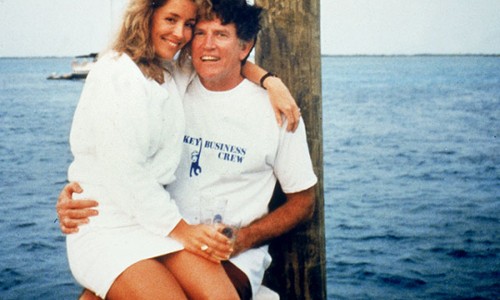Election Day is November 4, and it seems like we should know the candidates pretty well by now. Modern media and its tools for content creation and distribution are ever-present. The potential for rapidity and authenticity in political reporting is greater than ever.
So why doesn’t it seem like we know much that matters about the candidates this campaign season?
The answer to this question may lie in a political sex scandal that took place over 30 years ago. Matt Bai, Political Columnist for Yahoo News, has written a new book called All The Truth Is Out: The Week Politics Went Tabloid.
All The Truth Is Out is about the first modern-day sex scandal, which took down Democratic presidential nominee Gary Hart in 1987. In richly narrated and meticulously detailed prose, Bai raises questions about the changing ethos of journalism, and how the mistrust between candidates and reporters makes it hard for voters to find out where their candidates stand during campaign season.
I recently sat down and chatted with Bai over a glass of wine about his fascinating book, and about political reporting in this era of the scandal-driven news cycle. The interview has been edited for length and clarity.
Gina Cooper: On its surface, All The Truth Is Out is about Gary Hart, and a political sex scandal nearly three decades old. What drove you to write that story?
Matt Bai: You know, this all started for me back in late 2002, when I saw an item in the paper about Gary Hart considering another presidential run. I remembered him from when I was in college and he was the biggest thing in politics before the scandal destroyed him. And I thought, why would a guy who went through an ordeal like that ever want to go through it again? So I called him up and went to Denver and wrote a piece about him for the New York Times Magazine. He was just this brilliant guy, still, and very wounded.
 It wasn’t a bad piece, but it was kind of dismissive, and I came away feeling like I’d missed something. And then I went on to cover the next few presidential campaigns, and I kept noticing how the candidates were more and more withdrawn, less and less willing to talk to me like normal people or share any complex idea. They looked at me like I was a hired assassin. I kept thinking about Hart, for some reason. I thought there was a connection.
It wasn’t a bad piece, but it was kind of dismissive, and I came away feeling like I’d missed something. And then I went on to cover the next few presidential campaigns, and I kept noticing how the candidates were more and more withdrawn, less and less willing to talk to me like normal people or share any complex idea. They looked at me like I was a hired assassin. I kept thinking about Hart, for some reason. I thought there was a connection.
When I started looking back at [Gary Hart’s scandal] in 1987 again, I began to realize that everything we remembered was wrong. If you understood the real story, then I thought you actually had a better understanding of how we got where we are. So I decided to write a book.
GC: Your instincts were right. Something had been missed by every journalist on the planet until you unearthed what really happened.
MB: Well, yes and no. The public record on all of these events, at least at the time and in the years immediately after, was actually quite accurate. The reporters involved had written accounts that were very complete and reliable. The problem was that the country had misremembered it all. Somehow the words and pictures that stood out when the scandal was fresh became transmuted, if that’s the right word — we used them to construct a rationale for what had occurred, rather than see the events as they happened.
So the picture on the boat of Hart with Donna Rice on his lap didn’t actually drive him out of the race, and it wasn’t actually taken on a boat. It was taken on a dock full of tourists, and it didn’t surface until weeks after he had left the race. And that supposed challenge he issued, the “follow me around, put a tail on me” quote, was actually something he said to a single reporter, and the Miami Herald didn’t even know about that quote when they decided to put Hart under surveillance. Which is significant, because it means that Hart didn’t redraw all of boundaries between political lives and private ones. We did.
GC: Some of [journalism’s] old guard featured in your book have reacted strongly to the historical corrections you make. What would you like the rising generation of journalists to take from All The Truth Is Out?
MB: I get it. No one wants to look back on his career and think he might have made things worse instead of better, or that his life’s work is somehow more trivial than it should have been. I think that generation of journalists had some motives that were really understandable. Sure, a lot of them wanted to get famous and be celebrated like Woodward and Bernstein, but they also wanted to keep another liar like Richard Nixon from getting into the White House. They had learned the lesson that personal morality and character really mattered. I probably would have internalized that lesson the same way they did, honestly.
But what can the next generation take away? I think it’s about restoring some judgment and context to political journalism. We don’t have to cover every story, like helpless drifters pulled downstream in some powerful current. We’ve erected all kinds of rationales for why we have to write about every moral transgression or personal matter — because it’s already “out there,” or because “it’s not the sex, it’s the lie,” or whatever. But in the end we have choices. We don’t have to care so much about exposing every lie or the character flaw. We have the power to decide that’s not really the reason we’re here.
And when we do cover a story like that, because sometimes you have to, I don’t think it necessarily has to be so defining that it should eclipse everything else about a person’s life or career. Character is complicated. Truthful people sometimes lie. As Bob Kerrey, the former senator, said to me, “We’re not the worst things we’ve ever done in our lives, and there’s a tendency to think that we are.” He’s right, and that’s what I mean by context. You don’t want infallible politicians, believe me. If someone tells you they’re infallible, they’re lying for sure.
Gina Cooper consults startups disrupting regulated spaces and is obsessed with democracy, technology, institutions and the evolution of modern media. @ginacooper twitter.com/


